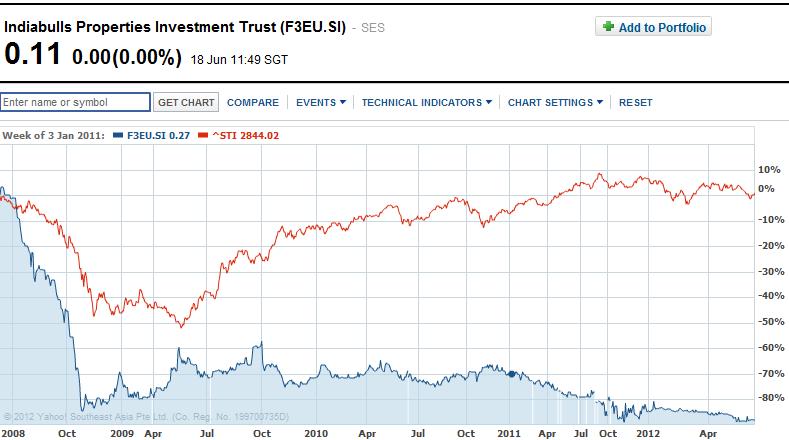Last Sunday Times article on Business Trust brought tears to my eyes..
You see, if Jonathon would have written the article (Growing hunger for business trusts) before I bought Indiabulls Properties Investment Trust, it could have save me my from my 88% capital lost! 🙁
The chart below shows the performance of this stock since IPO compared to STI index. Heartache or not?
I am still holding on this stock as a reminder of my foolish and naive choice at that time. I went in blindly without fully understanding the mechanics of it. At that time it was marketed as:
The Trustee-Manager of IPIT is Indiabulls Property Management Trustee Pte Ltd. The Trustee-Manager’s key financial objective is to provide the unit holders of IPIT with a competitive rate of return on their investment by ensuring regular and stable distributions to Unit holders in the medium to long-term and achieving long-term growth in the distribution per Unit (DPU) and net asset value (NAV) per Unit.
Sounds good right? Guess what… I never saw a single “stable distribution” at all. (More tears as I write this part)
So to make sure I remember this lesson and help others, I have compiled this comparison chart to give us a clear overall of the different trust and their pro and cons.
| Business Trust | REIT | Dividend stock | |
| Overview | A trust is a versatile vehicle that can invest in a wide range of sectors and assets as long as they can produce income, such as through long-term lease agreements to third parties | A security that invests in real estate directly, either through properties or mortgages. REITs receive special tax considerations and typically offer investors high yields, as well as a highly liquid method of investing in real estate. | A company that pay consistent dividends to its shareholder members. It is the portion of corporate profits paid out to stockholders |
| Example | Ascendas India, Perennial Retail China Trust, HPH Trust etc | Sabana REIT, Cambridge REIT, First REIT etc | SPH, Starhub, Comfort Delgro etc |
| Sector | All types of sectors. From Shipping to buildings to roads etc | Restricted to Real Estate | All types of sectors. From Shipping to buildings to roads etc |
| Asset to hold | No restriction | Only real estate | No restriction |
| Borrowings or Debt Gearing | No restriction | Borrow up to 35% without a credit rating and maximum up to 60% with a credit rating | No restriction |
| Payout | Can pay from underlying asset’s cash flow. Have to pay taxes. | 90% of earnings and do not have to pay taxes on profits | Can only pay out from profit. Have to pay taxes. |
| Last words | Try not to go for cyclical industry like shipping. Unless you understand the sector very well. Avoid IPO counters! | Not only do you have to make sure the cash flow is good, one also have to take note of gearing ratio. | Some companies do declare their dividend payout policy, so investors know what they will get. But most don’t to retain flexibility. So check track record. |
You can read more about the Straits Time article here. Or you can read more about REIT investment here.

Good site